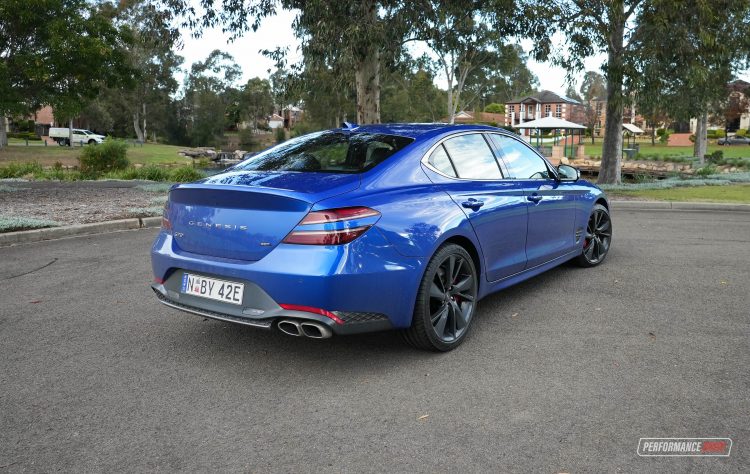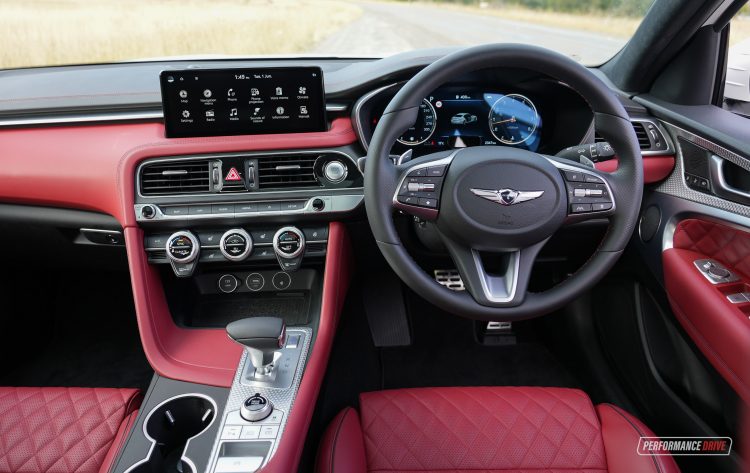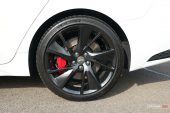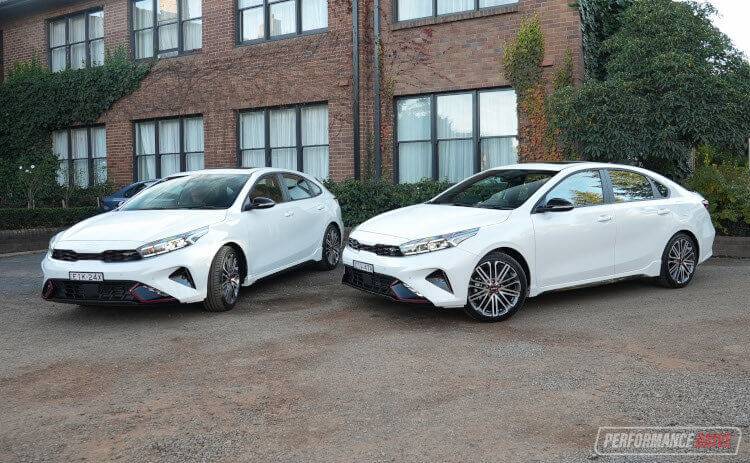And so here we meet again. A predicament. Do you buckle under the trending pressure and go for an SUV, or do you follow your heart and get that sports sedan you’ve always wanted? The 2021 Genesis G70 is here to yank you down off that fence.
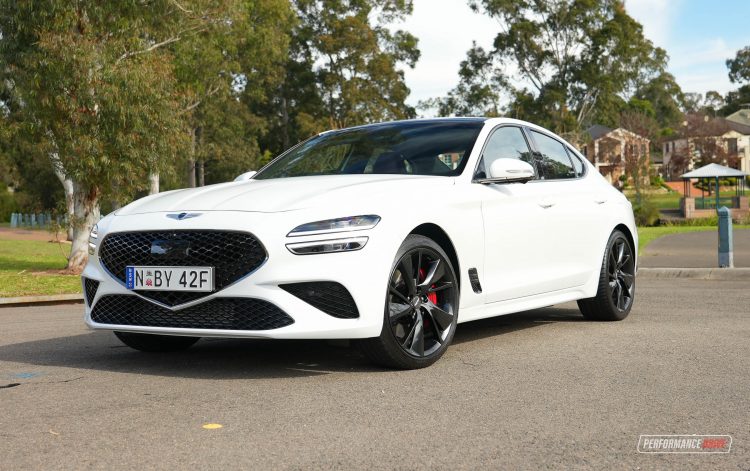
Look at it. It is a great piece of design, there’s no doubt about that. It looks like nothing else on the market. Actually, there is a bit of Bentley in the mesh for the front grille, and perhaps a bit of Alfa Romeo Giulia and Jaguar XE in the side profile. Aside from that though this is definitely a superb first-impressions car.
The new lineup consists of just two main variant grades; the 2.0T and 3.3T. In the 2.0T you’re propelled around by an eager turbo-petrol four-cylinder that generates 179kW and 353Nm, while the 3.3T incorporates a, despite what the badge might suggest, twin-turbo V6. Genesis engineers have fettled with the exhaust to extract an additional 2kW for the V6, so it now stands at 274kW and the same 510Nm. Both are rear-wheel drive in Australia and feed through an eight-speed auto.
Prices are very attractive for this market segment. The entry model starts from just $63,000, which is excellent, but the amount of kit packed in here just blows the competition out of the water. Even the absolute top-dog, top-shelf, top-deck range-topper with all options – including $2000 matt paint – starts from $88,000. When you factor in Genesis’s five-year warranty and five-year free scheduled servicing plan, and concierge and other perks, there just isn’t another contender that comes close in terms of absolute value for money.
2021 Genesis G70 2.0T – THE SPECS
[column width=”47%” padding=”6%”]Engine: 2.0-litre turbo four-cylinder
Output: 179kW@6200rpm / 353Nm@1400-3500rpm
Transmission: Eight-speed auto
Drive type: Rear-wheel drive
Wheels: F: 19×8.0, 225/40 R: 19×8.5, 255/35
ANCAP: Five stars
Kerb weight: 1699kg
Power-to-weight: 9.49:1 (kg:kW)
Official fuel economy: 9.0L/100km
Fuel capacity/Type: 60L/95 RON[/column] [column width=”47%” padding=”0″]Power efficiency: 19.88kW:L/100km
0-60km/h: 3.25 seconds*
0-100km/h: 6.78 seconds*
60-110km/h: 4.69 seconds*
1/4 mile: 14.91 seconds at 154.1km/h*
Max acceleration: 0.794g
100-0km/h braking: 2.94 seconds at 36.47 metres*
Max deceleration: -1.438g
Decibel at idle: 43*
Peak decibel at 60-100km/h: 87*
Priced from: $63,000[/column][end_columns]
2021 Genesis G70 3.3T – THE SPECS
[column width=”47%” padding=”6%”]Engine: 3.3-litre twin-turbo V6
Output: 274kW@6000rpm / 510Nm@1300-4500rpm
Transmission: Eight-speed auto
Drive type: Rear-wheel drive, limited-slip diff
Wheels: F: 19×8.0, 225/40 R: 19×8.5, 255/35
ANCAP: Five stars
Kerb weight: 1765kg
Power-to-weight: 6.27:1 (kg:kW)
Official fuel economy: 10.2L/100km
Fuel capacity/Type: 60L/95 RON
Power efficiency: 26.86kW:L/100km[/column] [column width=”47%” padding=”0″]0-60km/h: 2.55 seconds*
0-100km/h: 4.95 seconds*
0-200km/h: 17.23 seconds*
60-110km/h: 3.16 seconds*
1/4 mile: 13.12 seconds at 177.0km/h*
Max acceleration: 0.879g
100-0km/h braking: 3.04 seconds at 38.56 metres*
Max deceleration: -1.279g
Decibel at idle (/Sport mode): 46/52*
Peak decibel at 60-100km/h: 85*
Priced from: $76,000[/column][end_columns]
* Figures as tested by PerformanceDrive on the day. Factory claims may be different
2021 Genesis G70 – THE PACKAGE
Let’s get the negatives out of the way first, because there is a lot more to like about this cabin and packaging than not to like. Firstly, we don’t like that Genesis hasn’t provided interior ambient lighting. There is a semi-circle around the ceiling console and you can change its colour and whatnot, but for an interior this fancy it really needs to be lit up at night to be appreciated. During the day the diamond-stitched leather seats, cocooned driver’s area with wrapping centre console, and new 10.25-inch touch-screen with quality metallic switchgear, all presents wonderfully.
Another element that we think needs more attention is the media screen itself. Well, the menu functionality in some departments, more specifically. For example, if you want to browse radio stations you need to click through about 56 different menus. And this, we find, is a bit distracting when you’re trying to focus on keeping the car between the lines. Fortunately for such occasion the G70 comes with a full suite of active safety assist systems, including lane-keep assist. So even if you are a bit immersed in finding your favourite song, the car will give you a nudge in the right direction.
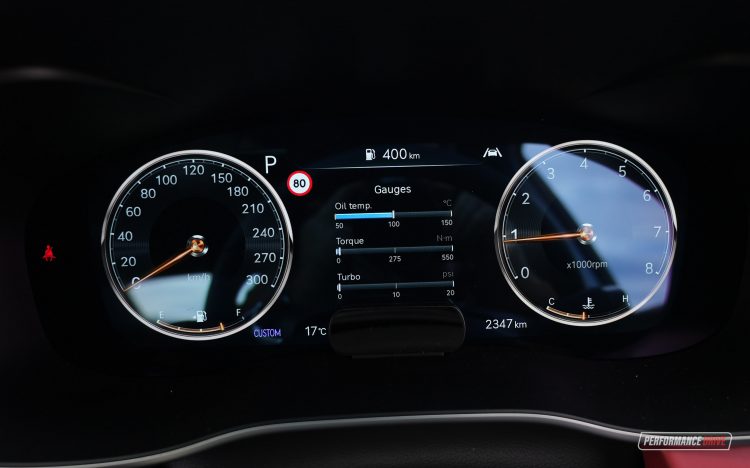
As standard, the new model features a fully digital 8.0-inch TFT instrument cluster, or an optional 12.3-inch unit with a 3D viewing option. We’re not a fan of the 3D effects as it can look odd, like it’s out of focus. It’s an interesting technology nonetheless, and you can easily just revert back to a normal 2D mode. Going for the 3.3T adds in a special sports gauge display as well, with things like turbo boost readouts, real-time torque output, a lap timer, and engine oil temperature.
A wireless phone charging pad is also standard and the geeks behind the system have boosted the output to 15W, so it charges faster than before. Other impressive standard items include a large sunroof, surround-view parking cameras, sat-nav, power front seats with heating and cooling functions, dual-zone climate control, and the usual sat-nav, Android Auto and Apple CarPlay, and adaptive cruise control. Some of this stuff is a big optional extra on the Euro rivals.
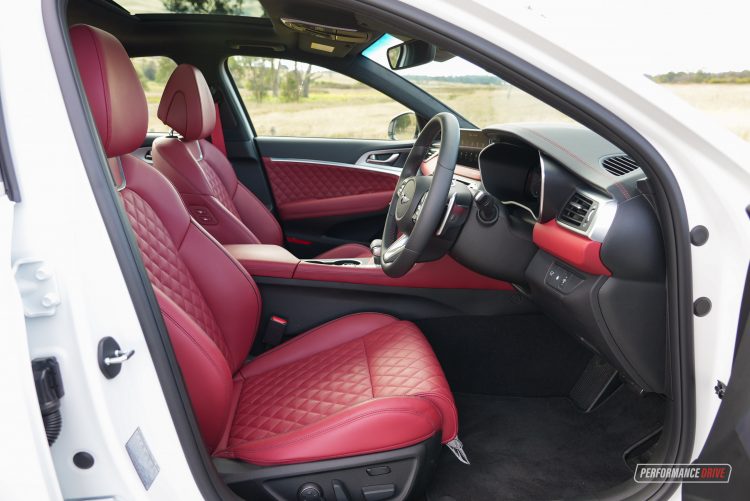
Passenger space and comfort remains mostly unchanged from before. In the front it offers excellent ergonomics so it is easy to find a nice and snug driving position, and the steering wheel falls right at your chest. The centre console and the way the dash wraps down and around all seems both practical while also secluding the driver somewhat and making him/her feel important. Visibility is also pretty good, although you do sit quite low as per this segment.
Rear seat space is just okay for this class. But it’s great to see climate vents and charging facilities back here. If you’ve ticked the Luxury Package ($10,000, on both 2.0T and 3.3T), you’ll get the easy access driver’s seat function. Essentially, the seat automatically slides back a bit and the steering wheel moves up a bit, providing additional clearance when exiting. We feel this is probably not necessary in such a small-ish sedan, especially when you end up crushing whatever is in the back each time you open the door. You can turn this function off, thankfully.
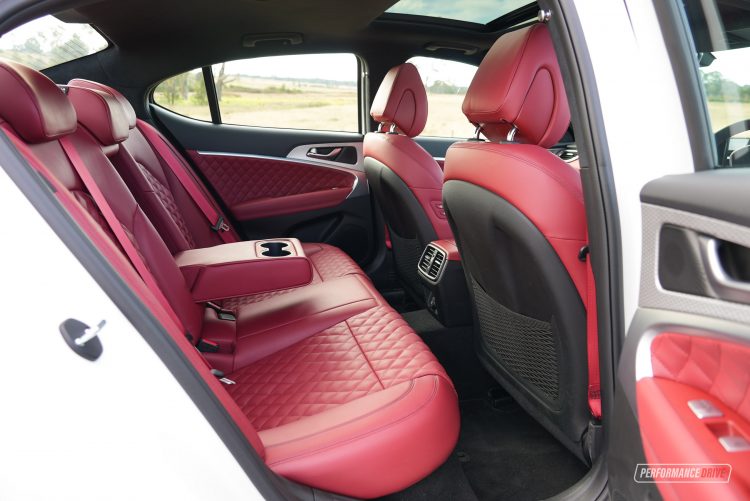
Boot space is also average for this class, measuring in at 330L. As we’ve said before, it actually seems a bit bigger than that in person. A space-saver spare wheel sits under the boot floor, helping to maximise the available volume.
2021 Genesis G70 – THE DRIVE
Genesis does have access to a new 3.5-litre twin-turbo V6, as we’ve already seen in the G80 and GV80. However, it’s our understanding that that unit is for all-new models only. So that’s why the G70 facelift missed out. While it might be a bummer the team has applied a very appealing tweak to this carry-over 3.3T engine. It now comes with a bi-modal sports exhaust as standard. Don’t worry, it’s not some loud and proud, barking unit that’ll wake up the neighbours. Instead, Genesis has installed a subtle enhancement.
The exhaust is a bit louder in the normal mode, which is good as the previous model was extremely quiet for a twin-turbo V6. But then when you select Sport mode or the new Sport+ mode the mufflers at the back open up to let out a more aggressive note. And it has helped extract that additional 2kW from the motor. We particularly enjoy the noise during lower revs. Up high there is a familiar whooshing sound. That’s if you have the ‘Active Sound Design’ system turned off.
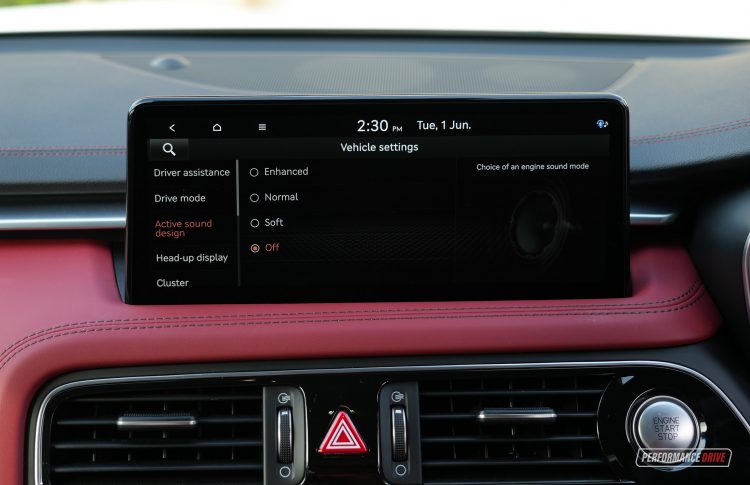
Yep, another car with fake sounds pumped through into the cabin. We’re not sure if all manufacturers are huddling together and purposely installing these stupid contraptions on purpose to annoy all the car enthusiasts out there, but seriously, they need to go. This engine does not need fake sounds coming through to the cabin. And more so now it’s equipped with a sporty exhaust. Fortunately, and unlike some cars, you can switch this system off. There’s actually three different levels of sound that you can toggle through.
So how’s the performance? We couldn’t match our previous best 4.68-second 0-100km/h time we achieved in the old 3.3T model. However, for this test we’re using a fully-kitted spec, while before we had a fairly basic version with no options. In other words, the vehicle we tested here is probably the heaviest the G70 gets. In the end the best we saw was 4.95 seconds using a Racelogic Vbox Sport. Using the usual private road we also ran the quarter mile in 13.12 seconds, and clocked 0-200km/h in 17.23 seconds. It doesn’t hang about, that’s for sure.
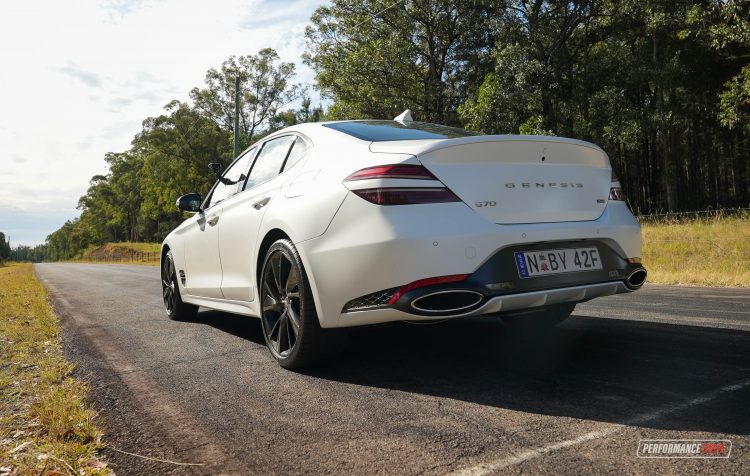
Out on a nice winding road the G70 3.3T is effortlessly rapid. The staggered-width 225 front and 255 Michelin Pilot Sport 4 tyres provide enormous grip, even under full power when exiting corners, and the chassis feels rigid and committed. Most of the time. When pushed really hard, perhaps beyond what any buyer would expect from this style of vehicle, the 3.3T can start to wallow around in the front end, and dip and lurch during left-foot braking. It can feel a bit uneasy during harsh acceleration too, almost like it has torque-steer.
Over in the 2.0T there is none of that. It feels really planted at all times. We think it’s probably the better-balanced setup overall. Of course, we totally understand why people will buy the 3.3T, as it is lots of fun. However, the 2.0T is a surprisingly confident bit of kit. Through sweeping bends, it feels easier to carry through high speeds. There is no floatiness across the front end (not that it’s much), and changing directions quickly is also done with finesse.
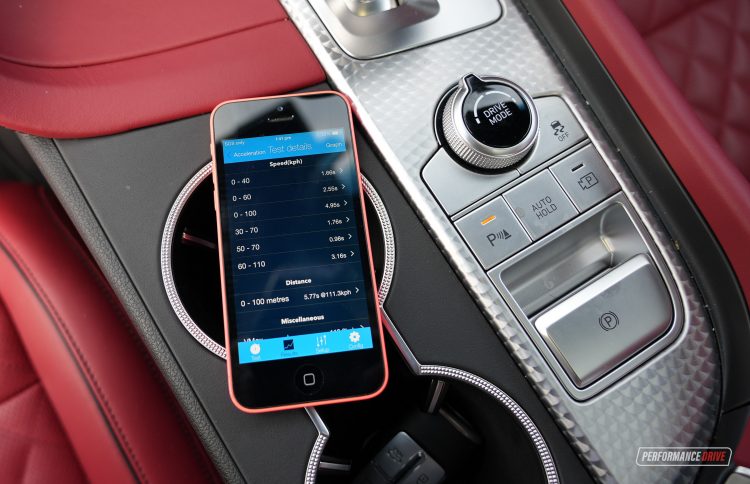
Interestingly, the 3.3T comes with adaptive dampers with selectable driving modes. We tried out the Sport+ setting during heated driving tests. This setting automatically switches the traction control off (not stability control), while providing the firmest suspension mode. Over in the 2.0T you get normal dampers. So, in that respect, it is very interesting to see engineers have come up with a superb tune for the analogue 2.0T.
Both models use an electronic power steering system which supplies a suitable amount of feedback, without being overly busy or sensitive. Both models also feature paddle shifters behind the wheel. Although there is still no set manual mode, now, as soon as you flick one of the paddles it turns into a manual mode. And this time it does not automatically upshift if you don’t – it will hit the rev limiter. It won’t automatically revert to auto mode either – you have to select D. This is unlike the old model which used to switch back to auto after a certain period.
Overall, this is an enjoyable sports sedan. It’s not a hardcore performance variant, so don’t expect it to behave like one. But it does provide similar thrills and certainly enough capability when you call for it. It’s also a lovely luxury vehicle around town, offering a comfortable ride and a placid, easy-to-steer nature.
2021 Genesis G70 – THE VIDEO
2021 Genesis G70 – THE VERDICT
This is a well-executed sedan that blends both luxury and sportiness in equal measure. Genesis has made some small but significant improvements for the new model in various areas to give it the best chance yet of fending off the established rivals.
While the driving experience is highly commendable and build quality inside is fantastic, we think it’s the sheer value for money and after-sales care that will (and should) attract most buyers. There is no other contender in this space that presents such a good case.
As always, if you’re thinking about buying a new car don’t forget to click here to speak with our car buying specialists.
